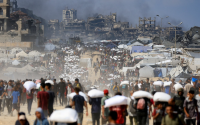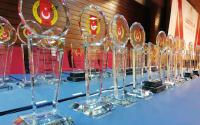Common Dreams / Published on Sunday, November 26, 2006 by the Hindu / Indial
For Nobel laureate Shirin Ebadi "human rights is a package....a way of seeing the world, a culture, which cannot "be imposed with cluster bombs" and brought to countries "in tanks".
"The world is turning into a unified village. We can see that in finance borders are eliminated. But when it comes to humanity the borders are still intact. And the problem is here. What needs to be globalised is human rights", the winner of the Nobel Peace Prize in 2003, said in conversation with a select media group here on Thursday.
Known for her crusade on human rights, Ms. Ebadi, who practises law in her country Iran where she "magically" escaped two assassination attempts, is particularly critical of the U.S.-sponsored "war on terrorism" and its effect on human rights. "Violence always brings violence." "Have we found the roots of terrorism?" she asks.
"Unfortunately today fighting terrorism has become a pretext to violate human rights. And states use national security to increase their power and control of the people. None of this will reduce terrorism," Ms. Ebadi who is on a brief visit to the city observed.
"Under that pretext of fighting terrorism America invaded Iraq and Afghanistan. Has it been reduced? Unfortunately it is only augmenting and increasing by the day. This can only mean that they have forgotten addressing the roots [of terrorism] and focusing on the end results... ." she said.
"We need to fight terrorism at its roots. Humanity is now on a boat. Everyone's fate is inter-related. Controlling the lives of citizens, listening in to their phone conversations, interfering with the private lives of people and limiting social and individual freedoms is not the answer.
Human rights are inextricably linked with the question of democracy.
"Today the U.S. claims it is in Iraq because it wants to put democracy on the pole. There is no question that Saddam [Hussein] was a dictator but my question is, was Saddam the only dictator in the world? Unfortunately we have many. The difference was that in Iraq oil can be found and in many other places it cannot."
She is both "against the forced wearing of the hejab as well against forcing women not to wear it... .women's rights, according to a famous saying, are human rights."
"All the limitations have always been imposed on women, men are free to wear whatever they want to — whether in Islamic countries or western countries, it always depends on who benefits from such impositions."
As for her views on the Shariat, "we need an interpretation of Islam which complies with human rights."
Has the Nobel Prize changed her life? "An award does not change one's personality. It has only increased my work. I still go to court, I still cook... Of course many doors have opened in the international arena and I am able to bring my voice to a lot many people" Ms. Ebadi, who has almost completed her next book on "fighting poverty."
"But I always wish that a day would be made up of 48 hours. The reason is, I have many thoughts that I can't find time to put down on paper."
To her a writer "does not write anything, it is the pen which does the writing." " I must abide by the pen and see where it takes me," she says. Her last book titled `Iran Awakening; A Memoir of Revolution and Hope' has been translated into 18 languages.






